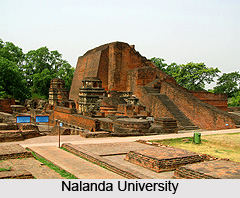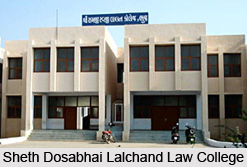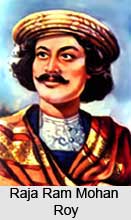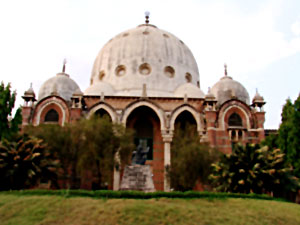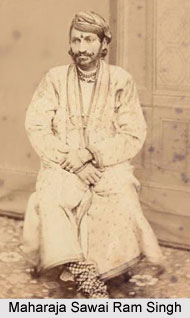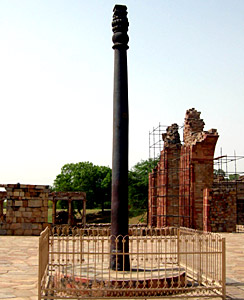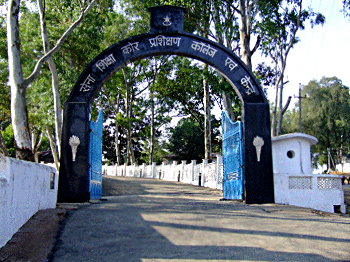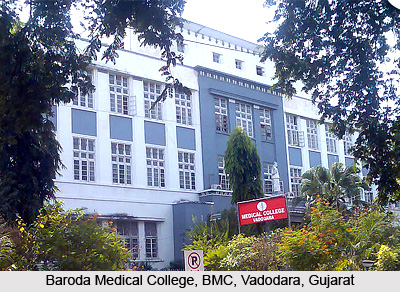 The Baroda Medical College, BMC is situated in the city of Baroda in Gujarat, India and it is one of the most respected medical institutions in India. The college was established in 1946. The college was envisaged by the late His Highness Sir Sayajirao Gaekwad III as a seat of learning. The late Maharaja of Baroda, Major General Sir Pratapsingh Gaekwad founded the Medical College Baroda and Shri Sayajirao General (SSG) Hospital in the city of Vadodara in January 1946. The Health Minister of Bombay State, Dr. M. D. D. Guilder inaugurated the Baroda Medical College, BMC on 16th June 1949. The first batch of the college, comprising of 40 students was passed out in 1954. The institute was entrusted to the first Dean and Medical Superintendent of S. S. G. Hospital, Late D. A. N. Deodars, for initial development. The degree awarded by the BMC, Baroda was recognised by the Medical Council of India and General Medical Council of Britain.
The Baroda Medical College, BMC is situated in the city of Baroda in Gujarat, India and it is one of the most respected medical institutions in India. The college was established in 1946. The college was envisaged by the late His Highness Sir Sayajirao Gaekwad III as a seat of learning. The late Maharaja of Baroda, Major General Sir Pratapsingh Gaekwad founded the Medical College Baroda and Shri Sayajirao General (SSG) Hospital in the city of Vadodara in January 1946. The Health Minister of Bombay State, Dr. M. D. D. Guilder inaugurated the Baroda Medical College, BMC on 16th June 1949. The first batch of the college, comprising of 40 students was passed out in 1954. The institute was entrusted to the first Dean and Medical Superintendent of S. S. G. Hospital, Late D. A. N. Deodars, for initial development. The degree awarded by the BMC, Baroda was recognised by the Medical Council of India and General Medical Council of Britain.
The principal objective of the Baroda Medical College (BMC), Gujarat is to provide a high quality of education to the medical students. The college has earned a lot of fame for its unselfish endeavors and it has often provided free medical assistance to the poor and needy students. The institution is also well known for playing a major role in improving health and hygiene within the city of Vadodara. The administration of the BMC, Gujarat has been striving very hard with an aim to reach the zenith of excellence in the field of medical education in Vadodara. The BMC, Gujarat provides separate accommodation for the male and female students, within the campus. The college is operating under the Faculty of Medicine of Maharaja Sayajirao University of Baroda in Western India.
The mission of the Baroda Medical College (BMC), Gujarat is to empower the students for the state of the art, to provide competent clinical practice with accurate and advanced knowledge, to provide appropriate community based general practice and also to provide managerial and clinical skills for the national programs. Apart from that, the college also tries hard for preparing the students in such a way that they should be able to perform general practice with holistic approach demonstrating complete understanding of human behaviour, at the end of the graduation. The students should also be able to independently run all the health programs at the Primary Health Center level besides clinical care and handle the situation of disasters and epidemics when required.
The large number of departments of the Baroda Medical College (BMC), Gujarat includes the Department of Anesthesiology, Department of Anatomy, Department of Biochemistry, Department of Forensic Medicine, Department of Medicine, Department of Microbiology, Department of Obstetrics & Gynecology, Department of Ophthalmology, Department of Orthopedics, Department of Otorhinolaryngology (ENT), Department of Paediatrics, Department of Pathology, Department of Pharmacology, Department of Physiology, Department of Physiotherapy, Department of Preventive and Social Medicine, Department of Psychiatry, Department of Radiology, Department of Skin and Venereal Diseases and the Department of Surgery.
The Baroda Medical College (BMC), Gujarat offers a large number of courses at the undergraduate and post-graduate level for the students. The courses are offered in the fields like Pediatric Surgery, Neurology, Nephrology, Cardiology, Endocrinology, Cardio thoracic & Neurosurgery, Plastic Surgery, Orthopaedics, Cardio thoracic & Neurosurgery, Paediatrics, ENT, Radiology, Psychiatry, Pathology and Anaesthesia. The courses offered by the Baroda Medical College (BMC), Gujarat include the MBBS programme at the undergraduate level. The post graduate education that the BMC, Gujarat offer include MD in Medicine, Obstetrics & Gynecology, Psychiatry, Radiology, Physiology, Pathology, Microbiology, Pharmacology; MS in General Surgery, Ophthalmology, ENT, Orthopedics and Anatomy; M. Ch in Plastic Surgery; PG. Diploma in Anesthesiology, ENT, Pediatrics, Obstetrics & Gynecology, Skin & Venereal Diseases, Pathology, Radiology, Ophthalmology and M. Sc. in Pharmacology, Microbiology, Biochemistry, Anatomy, Physiology. All the departments of the Baroda Medical College (BMC), Gujarat are recognized for PhD training programmes. The college and affiliated SSG Hospital, also serve as a nodal training center by providing continuing education to the physicians and health care staff in the state health department.
